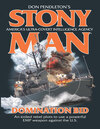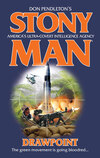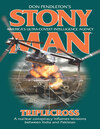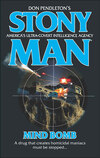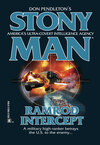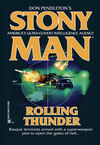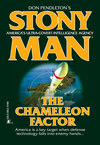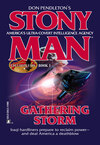Loe raamatut: «Domination Bid»
STONY MAN
The elite, covert agents of Stony Man Farm, comprising the best cyber techs and military in the world, act under orders of the President. Whether it’s stopping a terror attack overseas or saving civilians closer to home, the teams fight for freedom and peace.
DEADLY SCIENCE
A cutting-edge electromagnetic pulse weapon sets off a bidding war, and brokers from countries all over the world can’t wait to get their hands on it. But when the Libyan rebel behind the auction squeezes out the U.S., red flags are raised in Washington. Determined to keep the weapon of mass destruction away from hostile powers, Stony Man Farm has two choices: steal it from the rebel’s headquarters in Greece—or destroy it. While Phoenix Force deploys overseas, Able Team has its own mission. An American paramilitary contractor also wants the EMP device…and he’s willing to kill anyone who gets in his way.
“WATCH OUT!”
Mishka had missed the dark sedan that rolled alongside the driver’s side of her coupe.
McCarter reached beneath his coat and quick-drew a Browning Hi-Power. He aimed at the small window behind Mishka’s seat as the sedan swerved toward the coupe and tried to force her to crash into the cars parked along the road.
“Sorry ’bout the window, love!” he shouted before squeezing the trigger twice.
The first bullet shattered the coupe’s window and the second took out the passenger-side window on the sedan. The outline of a man’s face was all McCarter could make out in the dark, but he didn’t have trouble discerning the whites of his eyes. McCarter fired a third shot and the mask disappeared in a crimson spray. The sedan swerved as the driver whipped the wheel hard left and put the vehicle into a one-eighty.
McCarter grabbed a small walkie-talkie from his belt. “Gray One to team. You got that?”
“Saw it all, Gray One,” Encizo replied immediately. “Should we pursue?”
“Hell, yes,” McCarter muttered.
Domination Bid

Don Pendleton

Contents
Cover
Back Cover Text
Introduction
Title Page
CHAPTER ONE
CHAPTER TWO
CHAPTER THREE
CHAPTER FOUR
CHAPTER FIVE
CHAPTER SIX
CHAPTER SEVEN
CHAPTER EIGHT
CHAPTER NINE
CHAPTER TEN
CHAPTER ELEVEN
CHAPTER TWELVE
CHAPTER THIRTEEN
CHAPTER FOURTEEN
CHAPTER FIFTEEN
CHAPTER SIXTEEN
CHAPTER SEVENTEEN
CHAPTER EIGHTEEN
CHAPTER NINETEEN
CHAPTER TWENTY
CHAPTER TWENTY-ONE
CHAPTER TWENTY-TWO
CHAPTER TWENTY-THREE
CHAPTER TWENTY-FOUR
CHAPTER TWENTY-FIVE
CHAPTER TWENTY-SIX
CHAPTER TWENTY-SEVEN
Copyright
CHAPTER ONE
Minsk, Belarus
Night settled on the city as a blanket of fog rolled across the Svislach River and obscured the lights of Upper Town. Atlantic currents made the air feel dense as heavy humidity was normal to the city this time of year. However the rare lack of wind made the air stifling and Oleg Dratshev, used to the clear and crisp bite of northern Russia, found it a chore even to breathe.
Within a stone’s throw, Dratshev noted the smooth and precise movements of his shadowy escorts: four FSB agents assigned to monitor his every move. The Soviet secret service agents were constant companions with orders to protect him. Failing that, they were to ensure no one else could ever exploit his unique skills.
Dratshev had initially resisted the idea of coming to Minsk when he’d received orders direct from his Moscow masters—not for fear of his personal safety but simply because he preferred a more rural setting. Minsk epitomized the fast pace of Euro nightlife, a life simply not for him, but Dratshev knew such orders weren’t a suggestion. He watched the fog for a little longer before fishing a pewter and silver cigarette case from the pocket of his custom-tailored slacks. He lit his last cigarette and then leaned against the metal bench and considered his future.
Electromagnetic pulse weapons were his specialty and the reason for his transfer to Minsk. Representatives from the FSB’s special operations section were to take charge of Dratshev’s brainchild for practical testing in the unforgiving mountainous terrain of northern Belarus. To this point, the tests had been solely based on computer models. Now the time had come to demonstrate the capabilities of the EMP small-arms applications, code-named ZEMKOV, and prove once and for all the theories that had constituted the past fifteen years of Dratshev’s life.
As would any scientist in his position, Dratshev wondered of the far-reaching implications for the world. The science behind his invention was hardly new, but the practical applications scared him beyond his wildest imaginings.
He wanted to see it work, to see those things that had only existed in the neurons of his brain come to life. He did not relish the actual physical results.
Dratshev wondered if he was experiencing similar emotions to those of his predecessors—perhaps the creators of the atom and hydrogen bombs or space-based missile-defense systems. Only time and the writers of history would tell. It was difficult to imagine that, at barely thirty-five, he might well be judged by revisionists as a monster—a purveyor of death by simple virtue of his ability to conjure a weapon with enormous destructive capabilities.
The whisper-quiet pop, like that of a balloon, intruded on his deeper thoughts. He turned to his right in time to see one of the shadowy forms drop to the damp grass like a stone.
Dratshev felt the panic rise in the form of increased heart rate and a cold lump in his throat. The sound repeated, this time more like twig snapping, and Dratshev saw a second FSB agent fall.
Dratshev ripped the cigarette from his mouth and jumped to his feet. He looked for the other two agents who had been walking a perimeter to his left a minute earlier, but they were no longer visible. Dratshev whirled and ran up the hill at the back side of the bench along the river. He had difficulty finding purchase on the grass, damp from a hard and recent thundershower. His lungs burned with the exertion. He’d never been a physical man and the several bouts of pneumonia he’d battled as a child in the climates of Siberia and other similarly brutal environments made such activity more difficult.
Dratshev heard something behind him and turned long enough to catch a man he recognized as one of his escorts closing the distance. Dratshev slowed some, the sight of Kurig flooding him with hope. Kurig waved at him, shouting for Dratshev to keep running and as he got closer Dratshev spotted the pistol in Kurig’s other hand. A new burden of dread gripped Dratshev’s chest—it felt as if it might squeeze the life from him.
Finally, mercifully, Dratshev reached high and level ground. Directly ahead he spotted the road and the sparse traffic darting along the paved trail that wound through a commercial section of Minsk. Some of the businesses lining the far side of the street were closed, but a few were clubs and bistros open late. Dratshev knew the protocol for this instance, a protocol in which he’d drilled hundreds of times. If separated from his FSB bodyguards and under extreme emergencies, he was to find the most public venue he could and place a call to the special number he’d committed to memory. Someone would always answer that number, his handler and contact had assured him. Always.
Dratshev turned once more to see if Kurig had made progress, most assured he’d find the bodyguard now on his heels. Instead he caught just a glimpse of Kurig as the FSB agent fell. Dratshev saw the muzzle-flashes from Kurig’s pistol a moment later, heard the reports from the weapon as it echoed in the thick air.
Then the shooting stopped and Dratshev heard no more, saw no more movement from Kurig. It could’ve been the distance obscured by the mist but Dratshev knew better. Kurig was dead.
And Oleg Dratshev was now utterly and undeniably on his own.
* * *
MUSIC OF ORIGINS somewhere between punk and electronic dance blared from the speakers inside the club. The bass thumped irregularly in unsynchronized contrast to the regular thudding of Dratshev’s heart. A crowd of partying youths squeezed against him at every turn, making it impossible to discern friend from foe from neutral party. Dratshev willed his mind to remain focused. Logical, coherent thought had been a mainstay of his success for years and there was no reason to think it wouldn’t serve him now.
That’s why his government had protocols for this kind of thing. Not to mention that whoever had taken out the FSB detachment assigned to protect him wouldn’t attempt to kill him where so many witnesses could identify them. Even if his enemies weren’t afraid of the local police, they had very good reason to stay out of the sights of the FSB. That particular organization had a reputation of not only protecting its own but of becoming quite nasty when attacked without provocation.
Dratshev continued to take in his surroundings as he pushed his way through the throng of young men and women dancing, shouting and drinking.
One Emo chick—long dark hair framing a bony face doused heavily with makeup and black eye shadow and lipstick—offered Dratshev a smile as he passed. He returned the smile but pushed through. No time for socializing.
Dratshev liked his women, to be sure, but anyone could pose as much of a threat or hindrance as a good cover. Dratshev couldn’t afford the distractions right now, anyway. Best to keep his mind on business.
When Dratshev finally reached the back of the club, he searched for lighted signs against the wall pointing to the washroom. In places such as this, such hallways leading to them would also have pay telephones and that’s what he needed most right now.
He considered the cell phone in his pocket but wouldn’t risk turning it on until after he made his call. They would need the GPS signal from the phone to locate him, a signal that could be used by his enemies as much as his allies. Sure enough, when Dratshev found the hallway leading to the restrooms he found a bank of payphones.
Dratshev reached into his trouser pocket and withdrew a handful of coins. He dropped enough in to buy him initial credit to get an international operator to dial the special number.
Fortunately a door separated the hallway from the main club, so at least he could make out the female voice on the other end of the line.
“Yes, go ahead with your traffic.”
Dratshev gave his code name and ten-digit ID number. He answered the challenge question with the correct pass phrase and then waited while the woman routed him to his handler.
After a number of agonizing minutes elapsed the familiar voice of his handler came on the line. “What is it?”
“I’ve been compromised.”
“Where’s your security team?”
“They were neutralized.”
The handler swore. “This isn’t good.”
“I believe under the present circumstances that would probably be an understatement. Can you send me help?”
“Nearest team is at least an hour away. Where are you? Is your phone on?”
“No, I didn’t dare turn it on until I could verify contact with you.”
The handler hesitated in his reply. Dratshev found this odd. The handler finally said, “Of course…per protocol.”
“Yes, per protocol.”
“Okay, turn it on now. I will verify your position and then activate the closest unit. You are to stay exactly where you are until they contact you. Pass phrase will have changed by then, however. Please remember this so they do not kill you on sight.”
Dratshev frowned at this revelation on first hearing it, but then remembered the time difference. Per SOP, the FSB preferred to utilize UTC for all date-time references. By referencing Coordinated Universal Time, challenges and passwords remained consistent irrespective of geographical location anywhere in the world. Providing an incorrect pass phrase or challenge would most likely result in either termination of communications or, in the case of FSB assets, simply termination since it would be assumed an asset was either operating under duress or compromised beyond recovery.
As Dratshev reached inside his jacket to activate his mobile phone he replied, “Understood. I will hold hear and await extraction.”
Dratshev hung up, turned and proceeded into the restroom. He considered his options while he relieved himself. He could simply occupy one of the stalls and wait but that would leave him without any means of escape if the enemy found him first. Conversely, waiting out in the main part of the club would make him more conspicuous to any party that entered and might search for him in the crowd.
Either choice presented risks but the latter one made more sense. At least he could move around and use the crowd for cover if he spotted trouble before it spotted him.
Dratshev washed his hands and returned to the club proper. He shuffled along the edge of the crowd until he could find a free space at the bar. It took the service staff nearly two minutes to notice him. The bartender took his order for vodka, neat—Dratshev decided to limit it to one so as not to dull his senses. While he waited for his drink, Dratshev kept searching for threats. So far, it didn’t appear anyone posed a threat. When the bartender returned with his drink, he paid up including tip but sipped from the tumbler rather than hitting it all at once.
“Hello!” a voice called in his ear, the speaker’s lips so close her breath tickled his earlobe.
Dratshev turned with surprise to see the Emo chick from earlier. He tried for his best smile. “Hello.”
“I watched you walk past me,” she said, again leaning close so he could hear.
He reciprocated in like fashion and they continued that way throughout the conversation. “And?”
She shrugged. “You looked like maybe you wanted to say something.”
“Perhaps.”
“Just perhaps?” She grinned and winked. “You mean you’re not sure you wanted to say something to me?”
“Oh, I wanted to say something but I wasn’t sure how you’d take it. At least not coming from an old man like me.”
She laughed. “You’re not old!”
“Sometimes I feel old.”
“Well, maybe I could make you feel younger.”
“I bet you could at that.”
“So now who’s being inappropriate?” She tapped just above her very ample cleavage.
“Some would just say you’re honest.”
She nodded vigorously and then extended her hand. “I’m Mishka.”
He nodded and shook her hand lightly. “Oleg.”
“You’re not from Minsk?”
“You got me. I’m on vacation.”
“Where are you from originally?”
Dratshev thought about lying at first but remembered his training. The closer to the truth the easier to remember details if a discrepancy rose. Half-truths with leanings toward reality were the best.
Dratshev replied, “Moscow. Well, just north of there actually.”
“That’s crazy! I was actually born in Krakow.”
“Is that right?”
Mishka nodded; a freshly wild look in her eyes. “It is so nice to meet another Russian.”
“You don’t meet a lot of Russians here in Minsk?”
“Not really. I mean…at least none that stay around very long.”
“But actually, I’m on vacation. So I won’t be staying that long, either.”
“You’ll probably stay longer than you think.”
Dratshev couldn’t be sure what she meant at first but then he noticed just the slightest shift in Mishka’s gaze. He knew the telltale signs and he turned his attention toward the dance area in time to see several men approach from various directions.
He’d been betrayed! There could be no other explanation. Oleg turned from the men and tried to leave but he found Mishka blocking his path. He went to shove her aside but something stung his side. It felt as if a needle had been shoved into the space between his third and fourth ribs.
Dratshev’s mind began to swim and then he felt woozy and it became suddenly difficult to breathe. He heard Mishka scream and begin to shout in a dialect he didn’t recognize, but then it didn’t much matter because the periphery of his vision turned spotty. Stars danced in front of his eyes and his lungs burned not with the scar tissue of his past but more like that sort of respiratory attack brought on by suppressive chemicals.
With his head becoming foggy, his vision spotted and his capacity to oxygenate inhibited, Oleg Dratshev knew that to continue fighting and resisting would become futile. At long last he succumbed to the sweet rapture of what he assumed would be death and blacked out just a heartbeat after he felt his knees become wobbly. Then he hit the thinly carpeted floor of the club.
CHAPTER TWO
Oleg Dratshev woke to a dull ache in his head and a thick, dry tongue. When he ran his tongue inside his mouth he came away with a pasty feeling similar to what he might have experienced after a night of drinking. At first he thought maybe he’d been blindfolded but that quickly gave way to the sensation of dark, ominous shapes surrounding him.
Around him he perceived the steady, rolling drone of what could only be the vibrations caused by plane engines. Slowly his surroundings took shape and he realized he’d been secured to a reclining chair. His arms felt heavy and he reached to rub his eyes but the motions were stopped short. He felt his wrists and realized they were encircled by thick leather restraints. The subsequent jingling were those of chains attached to the restraints.
Low-watt, recessed lights above him came on and bathed his prison in a warm, red-orange glow. A door in the far wall of the compartment opened and two men entered. The first man was tall with a thick neck and muscular build. The man who followed stood much shorter. He was dressed with impeccable taste in tan slacks and a tailored silk shirt. Under the light, Dratshev found it difficult to determine the color but it looked perhaps aqua or azure in hue. He had black hair, dark skin and a neatly trimmed black beard with mustache.
The man sat in a chair directly across from Dratshev’s. The expensive leather creaked under his weight. The bigger man stood behind him with his arms folded.
“Good morning, Dr. Dratshev,” the seated man said in near flawless Russian. “I trust you enjoyed your nap.”
“Who are you?” Dratshev asked, his voice sounding muffled in his own ears.
“We’ll get to that in a moment,” the man replied with a pleasant smile. “Would you like something to drink? Water perhaps?”
Dratshev thought about a moment and then nodded. The man gestured to his companion, who immediately turned and left the compartment.
The man said, “The drug we used will leave you severely dehydrated. I’d suggest when my assistant returns that you sip the water rather than gulp it, as you might be tempted. I would not want to see you vomit, as this would only dehydrate you more.”
“You haven’t answered my question,” Dratshev said with a new sense of defiance.
“Fair enough. My name is Ishaq Madari. This will probably not mean anything to you.”
It didn’t and Dratshev saw no reason to pretend otherwise.
Madari continued. “I regret that I had to take such extreme measures to make your acquaintance but I can say with assurance that I have so long wished to meet you.”
“You may not feel the same way when my people discover that you have kidnapped me.”
“Perhaps,” Madari replied, inclining his head. He looked around the compartment a moment, appearing to gather his thoughts. “Once we’ve landed safely I will certainly make every effort to provide more comfortable accommodations. For the moment, however, I’m afraid this is the best I can do.”
The big man returned with bottled water. He opened the cap and handed it to Dratshev, who took it and tipped it high to his lips.
“Easy, Dr. Dratshev, please. As I said, too much too soon will make you ill.”
Dratshev remembered and resisted the urge to take more than a couple of swallows. When he’d finished drinking he asked, “Why you have done this? Do you realize who I am?”
“I do!” Madari clapped his hands like an excited child and then steepled his fingers and touched them to his chin. His dark brown eyes gazed on Dratshev with intense curiosity. “I would surmise there’s very little I don’t know about you, in fact. Your work in the field of electromagnetic pulse weapons is practically legendary in some circles. Oh, please, Dr. Dratshev, there’s no reason to look so surprised. The FSB lacks proper security precautions. Information can be had for the right amount of money, and money is a resource of which I have no short supply.”
“I don’t know what you’re talking about.”
Madari smiled and shook his head as if Dratshev had told a crude joke. “I’d hoped you’d have enough sense not to play such games with me. I’m aware of your fierce loyalty toward your government. I understand loyalty more than you could ever know. I used to have the same toward my own government.”
“And what government is that?”
Dratshev could see his ploy to glean as much information from his captor as possible wasn’t lost on Madari. It was a standard tactic his FSB instructors had taught him early in his career. As a military scientist, kidnapping was an all too real and constant threat. This wasn’t lost on those within the Russian government and they insisted on putting Dratshev through regular training so he would know how to handle most scenarios.
“I was born and raised in Libya, and a prominent member of its government. But that time has long passed. Like you, I was loyal to them and they betrayed that loyalty because of certain political views I had. Had I been a wiser man, I would’ve kept those views to myself but I believed in them so much that they ultimately became my undoing. So now I am an exile.”
“A very touching story,” Dratshev said as he took another sip. “However, it doesn’t change the fact that you have illegally seized a Russian citizen. My government will not sit still for this.”
“Please, Dr. Dratshev, let’s not squabble. You are my honored guest. And when I’ve obtained from you what I need you will be released back to your government unharmed.”
“Ha! You’ve killed my security team, drugged and kidnapped me. Those are hardly the actions of a gentleman.”
“They were extreme measures, agreed, but wholly necessary.”
“Just what is it you want from me?”
“Ah, now that’s the part I think will intrigue you most. I know you were transferred to Belarus to begin practical testing of your EMP theories and designs. I fully intend to give you that opportunity. Imagine that you will be able to expand your work beyond your wildest imagination.”
“That would be very difficult to imagine.”
“But true, nonetheless.” Madari sighed. “It may come as a surprise to you, but your government has been less than honest with you in the advancements they’ve made on your prototype designs.”
“Dishonest in what way?”
“In just how far they’ve gotten in the manufacture. They’ve been purposefully slow implementing your designs, fearful what would happen if they moved up the timetable, I would guess.”
“And how could you know this? Even if it’s true, it wouldn’t make any sense. Stalling progress of my research is hardly in their best interests.”
“Not when it comes to certain parties that may not be known to you—parties that have the direct confidences of your president. You see, there are conservative elements within your government that have been attempting to persuade investors buildup of conventional armament is the key to restoring Russian military superiority. They see technical advancements as merely fodder to be stolen by others and used against them. This is why they’ve done everything in their power to slow the manufacture of your prototypes.”
Dratshev shook his head. “Then why go to such great lengths to protect me? Why not simply kill me?”
“I do not have the answer to that question, although I have frequently considered it.” Madari gestured at him. “However, I think you are sufficiently intelligent enough that you have pondered this point yourself, and most likely formulated your own answer.”
Dratshev had, in fact, and it was something he’d dared never utter for fear it might become a reality. Those inside the government who preferred conventional military might would never have risked assassination for fear of alienating those holding the power of the purse. What impressed Dratshev, however, was Madari’s refusal to conjure some story in answer to Dratshev’s question. Madari’s simple acknowledgment of ignorance demonstrated a rare and unusual sense of honesty. Dratshev had to admit he actually found that refreshing.
“This is all interesting,” Dratshev said, “but it still doesn’t drill down to the reason you’ve gone to these lengths.”
Madari smiled and then stood. “I believe it would be wiser to wait until you are more lucid to engage in such a conversation. All in good time, Dr. Dratshev.”
Madari whirled on his heel and as he headed for the door he added, “In the meantime, please consider yourself a guest and, should you need anything, perhaps food or a blanket, my assistant will be happy to get it for you. You should take every opportunity afforded you on this point. We’re still six hours from our destination.”
When Madari was gone, Dratshev took time to inspect his bonds. As he’d suspected, the restraints circling his wrists were thick leather fastened by chains. Escaping such bonds would be impossible. He looked at his legs and noted they were also secured in like fashion.
Finally, Dratshev laid his head back and closed his eyes. Best to get as much sleep as possible and wait for a more opportune time to make his escape.
Sooner or later, he knew such a solution would present itself. It always did when one exercised patience.
* * *
ELEVEN MEN WAITED as their leader studied the facility through a night-vision scope. To local residents, it appeared to be nothing more than what it was advertised: a research center run by the department of agriculture.
Colonel Jack Cyrus knew it to be otherwise, which was why he and his team were in rural Iowa.
Cyrus lowered the scope and passed it to his second-in-command, Riley Braden. “Interesting. The security appears to be minimal.”
Braden took the scope and performed his own inspection. “I agree, sir.”
Cyrus tried not to wince at the “sir” despite the fact he understood it. It was protocol but difficult to hear coming from a man that had not only been his peer throughout their respective military careers, but also his friend since high school. In private, they addressed each other by name but out here in the field they had to set an example and chain of command in front of the others.
Braden continued. “Ten-foot fence with cyclone wire. No visible sentries, so probably armed security inside.”
“Rent-a-cops, at best,” Cyrus replied.
“And probably not that many.”
“Intelligence says they walk rounds with e-point checks at regular intervals. That means they can’t cover the whole area at one time.”
“I’d concur with that assessment,” Braden agreed. “What’s your plan?”
“We have to assume a facility of that size will have full video-and audio-camera surveillance.” Cyrus turned to Braden. “I see a training opportunity here, Major. What do you think is the best course of action?”
Braden didn’t hesitate in his reply. “Two teams. Breach the northeast corner of the perimeter fence. First team will locate the power sources and neutralize them, including generators. Second team makes entry to the building and then sends two to retrieve the data while the rest deal with any human elements. Outer team will provide perimeter and egress security, as well as mission failsafe.”
Cyrus nodded, impressed with his friend and colleague. “Excellent tactical plan, Major Braden. Exactly what I would’ve done. I’d say the decision’s been made.”
“Thank you, Colonel.”
“You’ll lead the inside team.”
Braden looked surprised. “I don’t know the job.”
“You know it as well as I do.”
“Yes, sir, but I was trained to do it only in the event you could not.”
“Nonsense. There’s no difference.”
“Sir, with all due respect, I strongly suggest you reconsider.”
Cyrus didn’t look at Braden as he responded in short fashion, “I already have, Major. It’s not a request. You will lead the primary team and you will accomplish the mission objectives as they’ve been given to us. Understood?”
“Yes, sir.”
“Then let’s move out.”
Braden nodded and turned to the team members he would now be leading on the mission. As he briefed them on the change in plans, Cyrus sighed. He’d considered sticking to the original mission parameters but he wanted his friend to take credit for what he knew would be another success. Their employer, who’d expressed reservations about bringing Riley Braden into the fold from the beginning, had to know that Braden had as much command ability and skill as Cyrus. This would be Braden’s chance to prove it without even being aware Cyrus was putting him to the test. Cyrus had learned long ago one mark of a good leader was to set up those in his command to succeed whenever possible. Not only did it boost morale but it also instilled confidence in self—not to mention what it did for unit cohesion.
The teams automatically performed a last check of equipment and then broke into approach formation. Every man knew what to do, where to stage in relationship to every other man, and what their individual responsibilities. They’d trained for this dozens of times until they’d had it down like clockwork.
